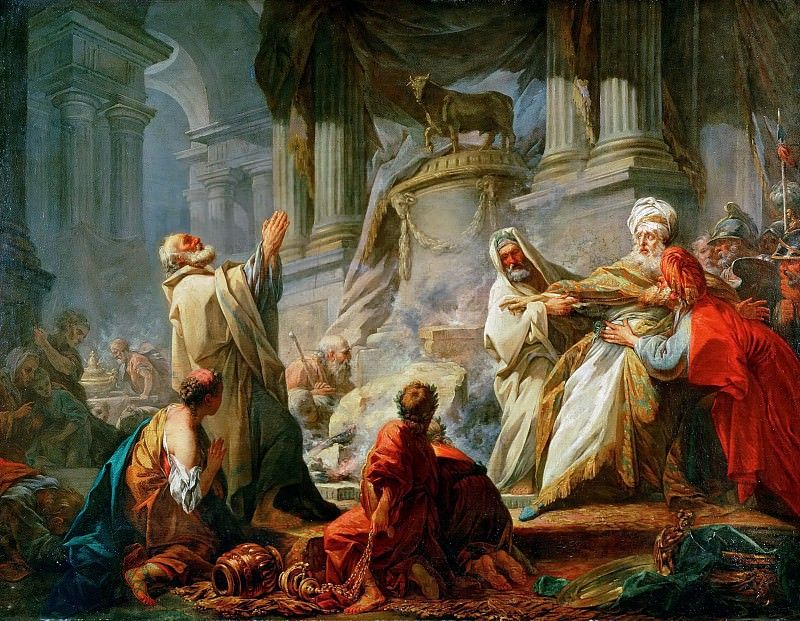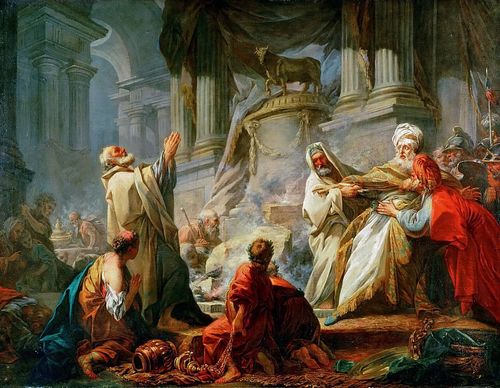Scripture Menu
1 Kings 12:21-24— Rehoboam
When Rehoboam came to Jerusalem, he assembled all the house of Judah and the tribe of Benjamin, 180,000 chosen warriors, to fight against the house of Israel, to restore the kingdom to Rehoboam the son of Solomon. But the word of God came to Shemaiah the man of God: “Say to Rehoboam the son of Solomon, king of Judah, and to all the house of Judah and Benjamin, and to the rest of the people, 'Thus says the LORD, You shall not go up or fight against your relatives the people of Israel. Every man return to his home, for this thing is from me.'” So they listened to the word of the LORD and went home again, according to the word of the LORD.
1 Kings 12:26-28— Jeroboam
Jeroboam said in his heart, "Now the kingdom will turn back to the house of David. If this people go up to offer sacrifices in the temple of the LORD at Jerusalem, then the heart of this people will turn again to their lord, to Rehoboam king of Judah, and they will kill me and return to Rehoboam king of Judah.” So the king took counsel and made two calves of gold.
Cogitations—
The kingdom is divided. The kingdom David carefully and skillfully curated, joining Judah to the northern tribes of Joseph. You think the gulf between southerners and Yankees here in the United States is a thing? Well, it pales in comparison to the underlying tensions that were fused into the Israel of God.
Forsaking the home turf of Hebron, King David established his capital city on the neutral ground of the ancient city of Jebus, that belonged to neither north nor south— much like the geographical disinterest of Washington D.C. (neither Virginia, nor Maryland, just in between the tween), the new City of David fit the diplomatic bill: “O Jerusalem, O Jerusalem, Get you up, arise and shine! O Jerusalem, O Jerusalem, Come and walk in the light divine.” Intriguingly, reading between the lines, towards the end of David’s reign it looked as if the unity of the song might come undone… but it held. Solomon, in his wisdom, held the country uneasily together with his administrative gorilla glue throughout his forty-year reign. It must have been an uneasy co-existence because when we meet Jeroboam, he apparently has many beefs with the way the King has lorded his authority over the northern tribes, seemingly demanding they make bricks without straw. There is literary resonance here with the Exodus narrative, except that here, Solomon has become Pharaoh-esque, and Jeroboam resembling Moses.
Rehoboam comes on the scene after the death of his illustrious father, and he displays exactly none of his father’s legendary wisdom. He spurns the counsel of older, wiser counselors when Jeroboam offers a willingness to keep the kingdom together. The old ones say (12:7), “If you [Rehoboam] will be a servant to this people today [the northern tribes] and serve them and speak good words to them when you answer them, then they will be your servants forever.” But Rehoboam is not Solomonic. He soaks in the counsel of his youthful rabble cohorts (12:10-11): “My little finger is thicker than my father's thighs [No comment here, this is a family blog]. And now, whereas my father laid on you a heavy yoke, I will add to your yoke. My father disciplined you with whips, but I will discipline you with scorpions.” And that’s how the cookie crumbled.
Jeroboam, up to this point, exudes hero vibes, but the shoe is about to be put on the other foot as chapter twelve moves to a conclusion. When the kingdom divides, Rehoboam makes a quick exit from Shechem and regroups in Jerusalem. He musters his army and is ready to make war on his rebellious subjects to the north. However, a prophet of God, Shemaiah, halts the move. (12:24) “Thus says the LORD, you shall not go up or fight against your relatives the people of Israel. Every man return to his home, for this thing is from me.” What comes next cannot be overstated. Totally unexpected based on what we’ve observed of the thinking process of this king. “So, they [Rehoboam and his friends] listened to the word of the LORD and went home again, according to the word of the LORD.” !
This is obedience. This is restraint. Rehoboam pulls back and must trust that God will provide for his tiny kingdom. If he was thinking like a worldly king, he would have been mistrustful. He would have demanded vengeance. He would have been uneasy with the current political arrangement. But it says, he trusted God and listened to the prophet’s counsel! There’s not much good said about this first king of the southern Kingdom of Judah, but he gets this one right. And the contrast could not be greater.
Jeroboam, in the remainder of the chapter, thinks and rules like all the other kings in that world. (12:26-28) “Jeroboam said in his heart, ‘Now the kingdom will turn back to the house of David. If this people go up to offer sacrifices in the temple of the LORD at Jerusalem, then the heart of this people will turn again to their lord, to Rehoboam king of Judah, and they will kill me and return to Rehoboam king of Judah.’ So the king took counsel and made two calves of gold.” Jeroboam goes rogue: He sets up two temples, one in Dan (archeologically uncovered and restored recently) and the other in Bethel with two golden calves gracing, a non-Levitical priesthood to serve, and a reconfigured festival schedule to normalize a new religious rhythm— all for the sake of an anxious king who fears losing the love of his people. Remember that God had earlier offered a lasting kingdom to Jeroboam, with a big “IF.” “IF you’ll be faithful, you will be blessed.” But Jeroboam must become a byword for the remainder of the Kings Story. “The sin of Jeroboam, son of Nebat” becomes the unwanted retrospective royal summary of subsequent kings.
I don’t want to be guilty of exegetical overload, but I do want to want to hand out an “Atta Boy!” to hapless Rehoboam for looking here much like his distant relative, Jesus. Jesus was able to say, “Not my will, but Thine” in the Garden of Gethsemane when he sweat drops of blood in agony, considering the suffering ahead of him in the darkness of that first Good Friday. So much to lose. But, ah, so much to gain. Faithfulness is costly. Let’s give some credit to Rehoboam. Let’s also recognize the Rehoboam in each one of our own hearts. We, like that king, are a mixed bag of faithfulness and sin. I think when we do this, we must needs come to greater appreciation for the faithfulness of the greater Son of David.

Art: “Jeroboam Offering Sacrifice for the Idol” by French artist Jean-Honoré Fragonard— It was commissioned by King Louis XV of France to decorate the castle of Fontainebleau, but it was never delivered. Instead, the work was sold to a private collector and eventually acquired by the Louvre Museum in 1936.


